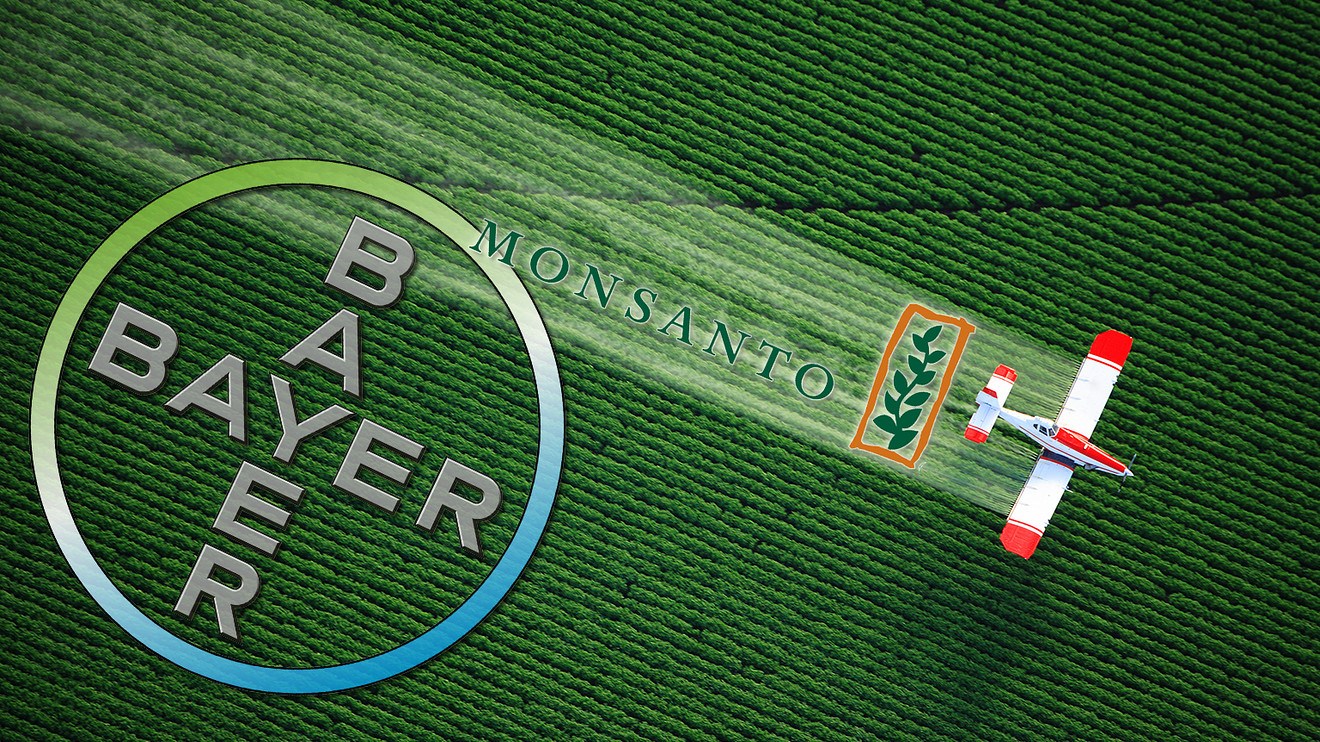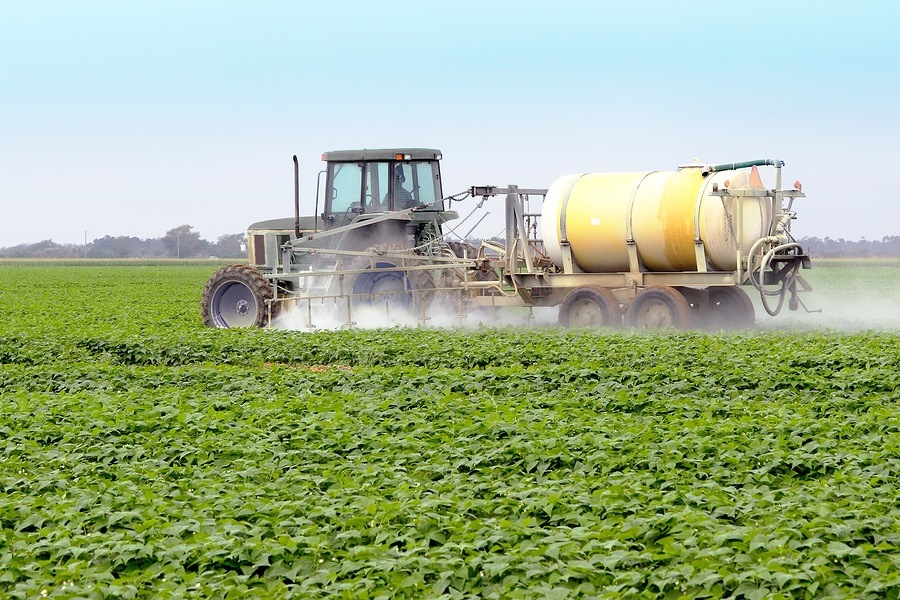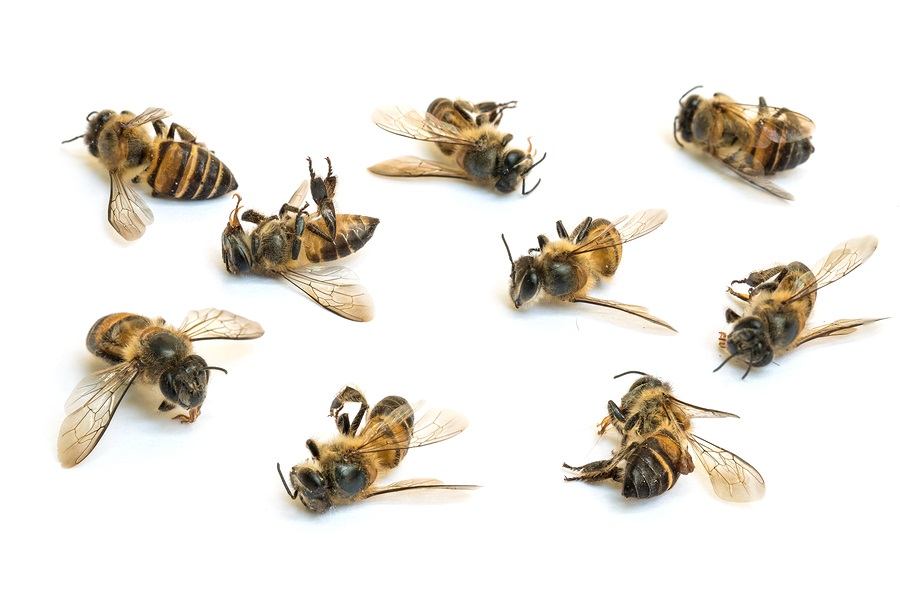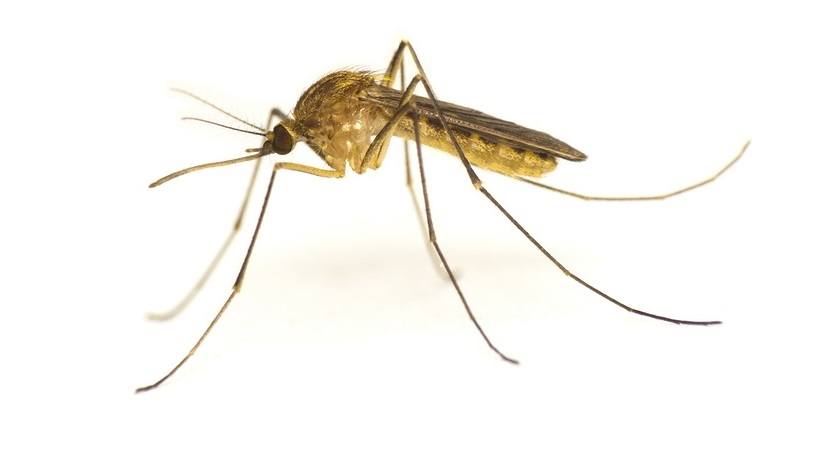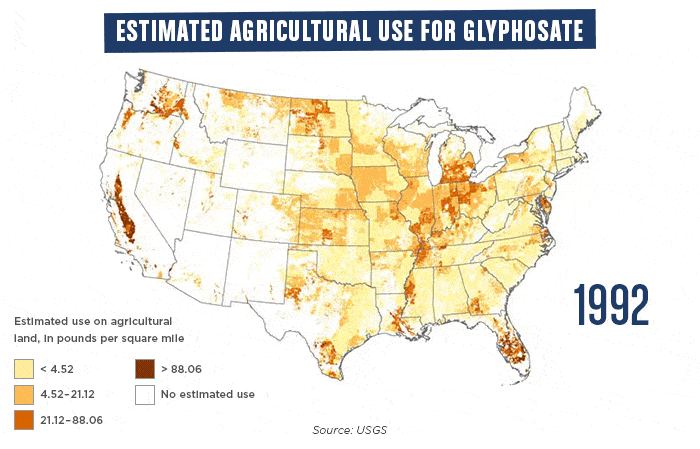News regarding the dangers of GMOs and biotech, and the advantages of organic sustainable agriculture.
Cancer Killing Off Plaintiffs As Monsanto Roundup Glyphosate Trials Stall in the Courts
There are currently more than 42,000 people suing Monsanto in the United States, alleging that Monsanto’s herbicides cause non-Hodgkin lymphoma. The lawsuits additionally allege that the company was well aware of the dangers but did nothing to warn consumers, working instead to manipulate the scientific record. Many lawyers are involved in more than one of the cases, and all have overlapping expert witnesses, setting up organizational and resource challenges for both sides. Multiple trials that had been set for this fall were delayed until next year. In the meantime, both sides of the litigation are keeping an eye on the California Appellate Court, where lawyers for plaintiff Dewayne “Lee” Johnson and lawyers for Monsanto are awaiting a date for oral arguments in their cross appeals. Monsanto is seeking to overturn the unanimous jury decision handed down against the company in August 2018. The trial judge in that case lowered the jury award from $289 million to $78 million and Johnson is appealing for the reinstatement of the full $289 million. Johnson was the first to go to trial against Monsanto and his victory sent share prices in Bayer plummeting just two months after Bayer closed the purchase of Monsanto in June 2018. Johnson was granted “trial preference” due to predictions by his doctors that he did not have long to live. Johnson has outlived those predictions, though his health continues to decline. As the litigation drags on, several plaintiffs have died or are nearing death, or have suffered such extreme health problems that their ability to undergo the rigors of depositions and trials has become limited. In some cases, family members are being substituted as plaintiffs for deceased loved ones. In legal parlance, the notices to the courts are titled “Suggestion of Death.”
Monsanto Loses Millions as Indian Cotton Farmers are Switching Back to Indigenous Seeds
Monsanto is making the news these days for losing. They have lost three court cases in which Roundup has been linked to cancer. In India, they are losing, too. After years of pushing a strain of Bt Cotton, Indian farmers have had enough and are switching back to native seeds for the cotton industry. It’s been a hard road for cotton farmers in India dealing with Monsanto. To begin with, Monsanto illegally began open field trials of its GMO Bt cotton in 1997 and announced it would begin selling seeds the following year. In turn, the Indian Supreme Court would not allow the biotech giant to sell seeds until 2002. Since then, over 300,000 Indian farmers have committed suicide. It is believed that many of these suicides were linked to major debts incurred by the systematic control of Monsanto and Bt cotton. Expensive seeds and the pesticides needed can only be bought from Monsanto. The agricultural ministry of India stated, “Cotton farmers are in a deep crisis since shifting to Bt cotton. The spate of farmer suicides in 2011-12 has been particularly severe among Bt cotton farmers.” Monsanto’s Bt cotton seeds have been dubbed “Seeds of Suicide” by residents in India. And now, India is waking up and ready to fight back. The Indian government has begun to promote the use of native varieties of cotton, seeds more specific to each area. In the time that farmers have begun switching back to indigenous seeds, Monsanto has seen a loss of $75 million.
FDA Pesticide Report: 84% Fruits, 53% Vegetables, 42% Grains Contaminated in U.S.
Last month the Food & Drug Administration published its latest annual analysis of the levels of pesticide residues that contaminate the fruits and veggies and other foods we Americans routinely put on our dinner plates. The fresh data adds to growing consumer concern and scientific debate over how pesticide residues in food may contribute – or not – to illness, disease and reproductive problems. Over 55 pages of data, charts and graphs, the FDA’s “Pesticide Residue Monitoring Program” report also provides a rather unappetizing example of the degree to which U.S. farmers have come to rely on synthetic insecticides, fungicides and herbicides in growing our food. We learn, for instance, in reading the latest report, that traces of pesticides were found in 84 percent of domestic samples of fruits, and 53 percent of vegetables, as well as 42 percent of grains and 73 percent of food samples simply listed as “other.” Roughly 94 percent of grapes, grape juice and raisins tested positive for pesticide residues as did 99 percent of strawberries, 88 percent of apples and apple juice, and 33 percent of rice products, according to the FDA data.
RoundUp Herbicide Glyphosate Impairs Honeybee Sensory and Cognitive Abilities
A new review of the scientific literature has found that exposure to glyphosate, the active ingredient in glyphosate herbicides like Roundup, impairs the foraging behaviour of honeybee workers and has adverse effects at different levels within the colony. Key points from the review include: * In 2015, of the 179.9 million ha of global GMO crop area, about 84% contained crops that carried herbicide-resistant genes. Most GMO crops are engineered for tolerance to glyphosate herbicides. * Glyphosate herbicides are also used on many non-GMO crops and in non-farm environments. * Honeybees' ingestion of food containing high concentrations of glyphosate resulted in a higher proportion of disoriented foragers. Despite this, honeybees continued foraging from resources that contain glyphosate traces. These sublethal effects on their learning abilities could impact not only the foraging efficiency, but also the coordination of collective activities within the colony. * Honeybees' ability to establish an association between an odour and a sucrose reward was impaired by an acute exposure to glyphosate. * There is evidence that glyphosate diminishes short-term memory retention in honeybees. * Honeybee colonies that are permanently exposed to glyphosate are likely to show a deficit in information propagation and nectar distribution. * Glyphosate causes changes in gut microbiota and greater susceptibility to pathogens and malnutrition.
Not All Stands in Farmer’s Markets Sell Healthy Food – How to Shop at Farmer’s Markets
With the fall season in full swing and harvest season upon us, most states feature farmer's markets where it is possible to purchase fresh food directly from the farm, while cutting out the middlemen that are typically involved in getting food to the consumer. However, just being in a farmer's market does not guarantee that the vendor is selling healthy food. Large farms that supply the same commodity-based food that you find in grocery stores will often have stands in farmer's markets as well. Fraud and deception can be just as common in farmer's markets as it is in chain grocery stores, but often consumers let their guard down simply because the illusion is that food at farmer's markets is healthier. And with the erosion of national standards to obtain USDA organic certification, simply being certified organic is not enough to ensure you are buying clean food. In fact, the costs of maintaining USDA organic certification may be prohibitive for the smaller-scale farmers, where today the healthiest food might be from these smaller-scale farmers who do not have organic certification. Asking the right questions, and if possible visiting the actual farm, is the best way to find the healthiest foods at farmer's markets.
GMO Mosquito Trials Scheduled for Florida and Texas
Oxitec is proposing to release its genetically modified (GM) OX5034 Aedes aegypti mosquitoes in the US states of Florida and Texas. The EPA has opened a public comment period. Oxitec's application says, "Female offspring of the OX5034 mosquitoes in the environment are expected to die before they mature into adults and therefore exposure to biting female mosquitoes is not anticipated." However, experience with another strain of Oxitec mosquito, OX513A, shows that Oxitec's claims that its GM mosquitoes are self-limiting are unreliable. The GM mosquitoes ended up breeding with native mosquitoes, transferring their genes into the natural population and forming hybrid mosquitoes that may be more vigorous and have a different disease-carrying potential. Please write to the EPA objecting to the release.
Lowe’s and Walmart Sued for Selling RoundUp Weed Killer Linked to Cancer
A lawsuit filed earlier this month in a Texarkana federal court seeks damages on behalf of Arkansas and California consumers who bought Roundup weed killer products from Lowe's stores in those states. The suit, filed Sept. 13 by Texarkana lawyer Steve Harrelson in the Texarkana Division of the Western District of Arkansas, seeks to represent anyone who bought a Roundup product from a Lowe's store in Arkansas in the five years preceding the filing of the suit and anyone who bought a Roundup product from a Lowe's store in California in the four years preceding the filing. The suit against Lowe's is similar to one Harrelson filed in August against Walmart. That suit seeks damages on behalf of Arkansas residents who purchased a Roundup product from an Arkansas Walmart.
Genetically Engineered Mosquitoes Escape Human Control and are now Spreading in the Environment
According to a new scientific publication, genetically engineered mosquitoes produced by the biotech company Oxitec (Intrexon) have escaped human control after trials in Brazil. They are now spreading in the environment. The yellow fever mosquitoes (Aedes aegypti) are genetically engineered to make it impossible for their offspring to survive. After release they were supposed to mate with female mosquitoes of the species which transmit infectious diseases, such as Dengue fever, to diminish the natural populations. However, the now published research shows that many offspring of the genetically engineered mosquitoes actually survived and are spreading and propagating further. According to the scientists, between 10-60 percent of the mosquitoes in the region concerned are inheriting parts of the genome of the mosquitoes released in the trials. These insects used in the laboratory have now mixed with the Brazilian insects to become a robust population which can persist in the environment over a longer period of time. They might replace the original insects on the long term and even exacerbate the problems associated with the mosquitoes. Christoph Then for Testbiotech commented, “The Oxitec trials have led to a situation that is largely out of control."
Missouri Farmer Who Ran Largest Organic Food Fraud Scheme in U.S. History Takes Own Life Instead of Reporting to Prison
Last month (August, 2019), U.S. District Judge C.J. Williams sentenced Missouri farmer Randy Constant to 10 years in prison in what is reportedly the largest organic food fraud scheme in U.S. history. Judge Williams gave shorter prison terms to three Overton, Nebraska, farmers whom Constant recruited to join the scheme. According to the Associated Press: "The farmers reaped more than $120 million in proceeds from sales of the tainted grain. The scheme may have involved up to 7 percent of organic corn grown in the U.S. in 2016 and 8 percent of the organic soybeans, prosecutors said. 'Thousands upon thousands of consumers paid for products they did not get and paid for products they did not want,' Williams said. 'This has caused incalculable damage to the confidence the American public has in organic products.' Williams said the scam harmed other organic farmers who were playing by the rules but could not compete with the low prices offered by Constant’s Iowa-based grain brokerage, and middlemen who unknowingly purchased and marketed tainted organic grain." Randy Constant reportedly never showed up to serve his prison term, but committed suicide instead.
RoundUp Herbicide Glyphosate Linked to Increased Rates of Colorectal Cancer in Young Adults
Colorectal cancer has increased by 51% in Americans under age 50 since the mid-1990s, and researchers suggest that “early life exposures…may be contributing to the rise” in that age group. A leading hypothesis is that gut dysbiosis is playing an active part—perhaps by disrupting young people’s immune response and triggering overactivation of cell signaling proteins in the colon. Some researchers have even posited a “bidirectional self-feeding relationship” between the gut microbiome and colorectal cancer, with gut dysbiosis contributing to colorectal cancer growth and progression, and tumor growth in turn disturbing the gut microbiome. Autism investigators have been at the forefront of research on the gut microbiome. They point to environmental toxins and antibiotic use as two influences that can shift the gut’s microbial composition in an unfavorable direction. Scientists attribute up to 85% of colorectal cancers to environmental and microbial factors. Glyphosate (the leading ingredient of Roundup) is both an herbicide and a patented antimicrobial. Could the upward trend in glyphosate usage that began roughly three decades ago have something to do, therefore, with the skyrocketing incidence of colorectal cancer in young people? Although recent court cases linking Roundup to cancer have focused mostly on other types of cancer such as non-Hodgkin’s lymphoma, the evidence that glyphosate wreaks havoc with gut bacteria has led many researchers to suspect that the answer is yes.




